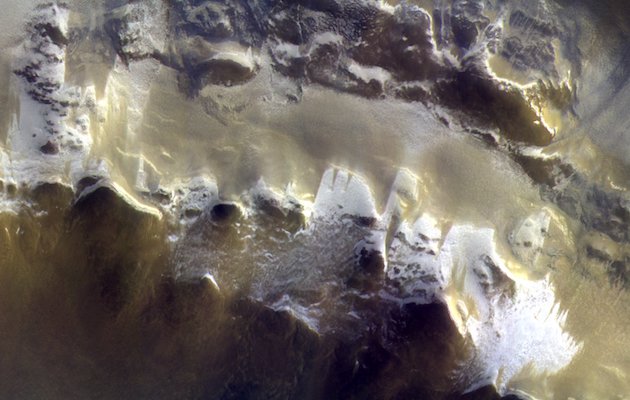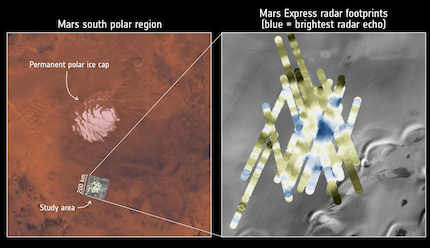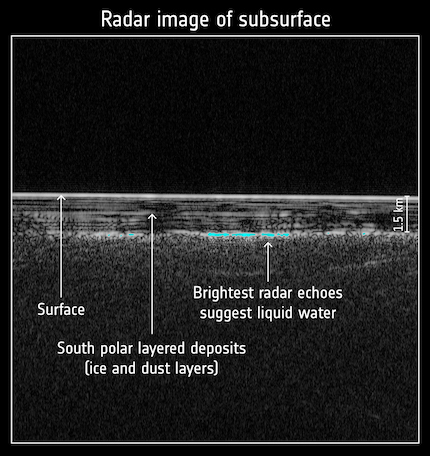“The presence of water in Mars does not imply the existence of microscopic life”
Author and PhD in Biology, Antonio Cruz, analyses the importance of the finding of a lake of liquid water in Mars, made by the European Space Agency.
Protestante Digital · 01 AUGUST 2018 · 17:05 CET

The announcement of the discovery of liquid water on Mars has generated great expectation.
On July 25, the European Space Agency (ESA) detected a lake of liquid water, buried under layers of ice and dust in the south polar region of Mars.
The research has been carried out by a team of Italian scientists, who using a specialized radar of low frequency, have managed to draw the "map" of this underground lake, being able to determine its depth and length.
A CAREFUL MEASUREMENT
Ground-penetrating radar uses the method of sending radar pulses towards the surface and timing how long it takes for them to be reflected back to the spacecraft, and with what strength.
The data was taken between May 2012 and December 2015, in the Planum Australe region, located at the southern end of the planet.
This is how researchers have been able to find an area of about 20 kilometers with “echoes” that can be explained by the presence of water in a liquid state about 1.5 kilometers deep, a phenomenon similar to that of watery formations at the poles of the Earth.
Scientists are still investigating why the water remains in liquid state, despite the very low temperatures at that depth.

The authors suggest that magnesium, calcium and sodium salts, which are known to be present in Martian rocks, may be dissolved in water forming a brine.
That fact, along with the pressure exerted by the layers of ice above, would reduce the melting point and allow this Martian lake to remain liquid, as happens to the terrestrial lakes.
It is known that there are some microorganisms, that is, there is life, in the subglacial environments of the Earth. However, it is not clear that that can occur in Mars.
“AN IMPORTANT DISCOVERY"
Antonio Cruz, PhD in Biology, a regular author of Evangelical Focus, believes that this finding is important to “know the geophysics of Mars as well as the environmental conditions on its surface”.
However, the data provided by the scientists distances the possibility of being able to carry out a more exhaustive exploration of the land.
“The temperatures of the place where such a salt lake has been found are up to 120 degrees Celsius below zero, so that the water would be under a layer of ice and dust about 1,500 meters thick. It is not currently possible to drill this layer to take samples of the water, and check whether there is microbial life or not”.

NO DIRECT CORRELATION BETWEEN WATER AND LIFE
Many people believe that the presence of water is a key factor to develop life outside of the planet Earth.
However, Antonio Cruz considers that it is essential to clarify what type of water has been found.
“The presence of salt water does not necessarily imply the existence of microscopic life. That depends on a delicate balance of ions and salts that do not occur in any salt concentration. Even less in those that should supposedly take place in water as salty and cold as that of the red planet”.
Bearing this in mind, it is incorrect to say that this finding opens the door to the presence of life on Mars.
“Astrobiologists know well that the conditions of the Martian surface are not suitable for life, at least for life as it is known on Earth. No microorganism that currently exists on our planet would be able to thrive on Mars, due to the extreme environmental conditions that it has”, he says.
“Those who believe that there could be life should make many previous assumptions, such as that it might be a life different from Earth and not based on oxygen and carbon; that perhaps there is a flow of geothermal heat that heats the water, thus lowering its salinity incompatible with life; that, although at the moment there is no access to that water, perhaps in the future we will have indirect systems to analyze their chemical composition”, Cruz adds.
Antonio Cruz finally warns that “one thing is the desire to discover life on Mars and another, quite different, the reality of the observations made”.
Published in: Evangelical Focus - science - “The presence of water in Mars does not imply the existence of microscopic life”
